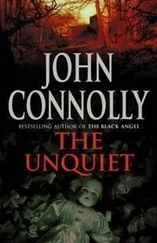“A woman told me of a book, a part of the biblical apocrypha,” I said. “I read it. It spoke of the corporeality of angels, of the possibility that they could take upon themselves a human form and dwell in it, hidden and unseen.”
Epstein was so silent and still that I could no longer hear him breathe, and the slow rise and fall of his chest appeared to have ceased entirely.
“The Book of Enoch,” he said, after a time. “You know, the great rabbi, Simeon ben Jochai, in the years following the crucifixion of Jesus Christ, cursed those who believed in its contents. It was judged to be a later misinterpretation of Genesis because of correspondences between the two texts, although some scholars have suggested that Enoch is actually the earlier work, and is therefore the more definitive account. But then, the apocryphal works-both the deuterocanonical books, such as Judith, Tobit, and Baruch, that follow the Old Testament, and the excised later gospels, like those of Thomas and Bart-holemew-are a minefield for scholars. Enoch is probably more difficult than most. It is a genuinely unsettling piece of writing, with profound implications for the nature of evil in the world. It is hardly surprising that both Christians and Jews found it easier to suppress it than to try to examine its contents in the light of what they already believed, and thereby attempt to reconcile the two views. Would it have been so difficult for them to see the rebellion of the angels as being linked to the creation of man? That the pride of the angels was wounded by being forced to acknowledge the wonder of this new being? That they perhaps also envied its physicality, and the pleasure it could take in its appetites, most of all in the joy that it found by joining with the body of another? They lusted, they rebelled, and they fell. Some descended into the pit, and others found a place here, and at last took upon themselves the form that they had so long desired. An interesting speculation, don’t you think?”
“But what if there are those who believe it, who are convinced that they are these creatures?”
“Is that why you want to see Kittim again?”
“I think,” I said slowly, “that I have become a beacon for foul things, and the worst of them are now closer than they have ever been before. My life is being torn asunder. Once, I could have turned away, and they might have passed me by, but it’s too late for that now. I want to see the one you have, to confirm to myself that I am not insane and that such things can and do exist.”
“Perhaps they do exist,” said Epstein, “and maybe Kittim is the proof, but we have encountered resistance from him. He very quickly built up a tolerance to the drugs. Even sodium pentothal no longer has any significant effect. Under its influence, he merely rants, but we have given him a strong dose in anticipation of your visit, and it may allow you a few minutes of clarity from him.”
“Do we have far to go?” I asked.
“Go?” said Epstein. “Go where?”
It took me a moment to understand.
“He’s here ?”
It was little more than a glorified cell, accessed through a utility closet in the basement. The closet was encased in metal, and the back wall doubled as a door, accessed by both a key and an electronic combination. It swung inward to reveal a soundproofed area, divided in two by steel mesh. Cameras kept a constant vigil on the area behind the wire, which was furnished with a bed, a sofa, and a small table and chair. There were no books that I could see. A TV had been fixed to the far corner of the wall, on the other side of the barrier and as far away from the cell as possible. There was a remote control device for it on the floor beside the sofa.
A figure lay on the bed, wearing only a pair of gray shorts. His limbs were like bare branches, with every muscle visible to the eye. He looked emaciated, thinner than any man that I had ever seen before. His face was turned to the wall, and his knees were drawn up to his chest. He was almost bald, apart from a few stray strands of hair that clung to his purple, flaking skull. The texture of his skin reminded me of Brightwell and the swelling that afflicted him. They were both beings in the process of slow decay.
“My God,” I said. “What happened to him?”
“He refused to eat,” said Epstein. “We tried to force-feed him, but it was too difficult. Eventually, we came to the conclusion that he was trying to kill himself, and, well, we were prepared to see him die. Except he didn’t die: he merely grows a little weaker with every week that goes by. He sometimes takes water, but nothing more. Mostly, he sleeps.”
“How long has this been going on?”
“Months.”
The man on the bed stirred, then turned over so that he was facing us. His skin had contracted on his face, so that the hollows in the bone were clearly visible. He reminded me of a concentration camp inmate, except that his catlike eyes betrayed no hint of weakness or inner decay. Instead they glittered emptily, like cheap jewels.
Kittim.
He had emerged in South Carolina as an enforcer for a racist named Roger Bowen, and a link between the preacher Faulkner and the men who would have freed him if they could, but Bowen had underestimated his employee and had failed to understand the true balance of power in their relationship. Bowen was little more than Kittim’s puppet, and Kittim was older and more corrupt than Bowen could ever have imagined. His name hinted at his nature, for the kittim were said to be a host of dark angels who waged war against men and God. Whatever dwelt within Kittim was ancient and hostile, and worked for its own ends.
Kittim reached for a plastic beaker of water and drank from it, the liquid spilling onto the pillow and sheets. He raised himself until he was seated on the edge of the bed. He stayed like that for a time, as though building up the strength that he needed, then stood. He wavered slightly, and seemed about to fall, but instead shuffled across the cell toward the wire. His bony fingers reached out and gripped the strands as he forced his face against the mesh. He was so thin that, for an instant, I almost thought he might try to press his face between them. His eyes shifted first to Louis, then to me.
“Come to gloat?” he said. His voice was very soft, but betrayed no hint of his body’s decay.
“You don’t look so good,” said Louis. “But then, you never looked good.”
“I see you still bring your monkey with you wherever you go. Perhaps you could train him to walk behind you holding an umbrella.”
“Still the same old joker,” I said. “You know, you’re never going to make friends that way. That’s why you’re down here, away from all the other children.”
“I am surprised to see you alive,” he said. “Surprised, yet grateful.”
“Grateful? Why would you be grateful?”
“I was hoping,” said Kittim, “that you might kill me.”
“Why?” I replied. “So you can…wander?”
Kittim’s head tilted slightly, and he looked at me with new interest. Beside me, Epstein was watching us both carefully.
“Perhaps,” he said. “What would you know of it?”
“I know a little. I was hoping you could help me to learn more.”
Kittim shook his head.
“I don’t think so.”
I shrugged.
“Then we’ve nothing more to say. I would have thought that you’d be glad of a little stimulation, though. It must get lonely down here, and dull. Still, at least you have a TV. Ricki will be coming on soon, and then after that you can watch your stories.”
Kittim stepped away from the wire and sat down once again on his bed.
“I want to leave here,” he said.
“That’s not going to happen.”
“I want to die.”
Читать дальше












